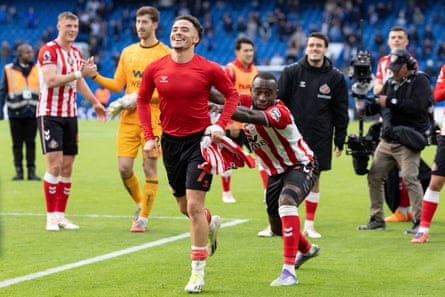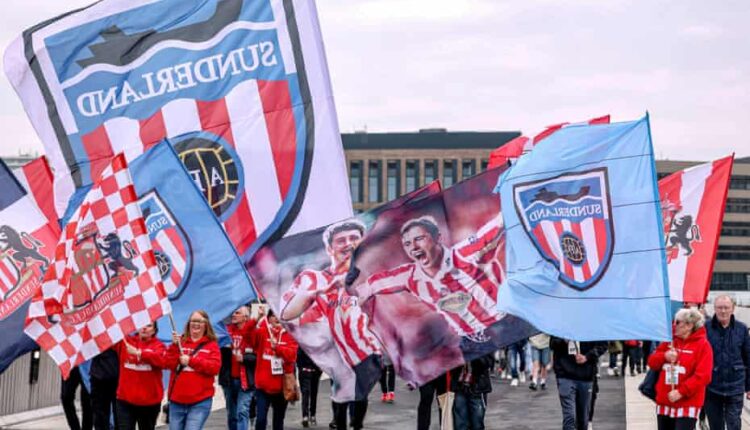Smells like team spirit to Régis Le Bris as Sunderland confound the doubters.
Players’ desire to put the team’s best interests ahead of their own has generated a sense of camaraderie, which has produced rewards on the pitch.
A wheel turns full circle
When David Moyes left as Sunderland manager in May 2017, following a disastrous 10 months that culminated in relegation to the Championship, he relinquished his rights to a payout.
Moyes knew he had failed, but he received a poisoned chalice, which was perhaps reinforced as the team quickly dropped into League One. Moyes is now back in his Merseyside comfort zone, and Sunderland has finally returned to the top flight.
When he takes Everton into the Stadium of Light, the Scot may be surprised to see players of the calibre of Granit Xhaka, Enzo Le Fée, Nordi Mukiele, and Reinildo wearing red and white stripes. That quartet arrived from Bayer Leverkusen, Roma, Paris Saint-Germain, and Atlético Madrid, respectively.
And to think Moyes repeatedly stated that top footballers would not relocate to Wearside because they preferred to live in London or Manchester.
Despite this, according to club sources, no prospective signings have enquired about the club’s geography this summer.
The football club is quickly becoming a magnet for ambitious young players from around Europe, just as the local council is luring outside investment and IT workers by rebranding Sunderland as a technology cluster located in “the city by the sea”.
Unity behind the scenes
Sunderland made 14 additions during a transformative summer. That would normally cause chaos, but Régis Le Bris has kept the old guard completely on board. So far, the revolution has proven to be more velvet than bloody.
Last season, Luke O’Nien and Dan Neil were club and team captains, respectively, however while O’Nien keeps his position, Neil’s was granted to Xhaka in July.
Rather than pouting, Neil and O’Nien – who are now substitutes rather than starters – have assisted Switzerland’s captain and former Arsenal and Bayer Leverkusen midfielder in directing the dressing room, preventing it from splintering along old guard/newcomers lines.
When Chemsdine Talbi scored a late goal to give Chelsea a 2-1 victory, Neil and O’Nien were the first to come off the bench to applaud their teammates.

“It was a very positive reaction,” explained Le Bris. “You can feel frustrated, which is completely understandable, but you can also relish your teammates’ victories. The dressing room is quite pleasant. We have no issues.
We had 14 new players, yet it felt like they had been here for two or three seasons.” Le Bris believes that much of the credit goes to Xhaka. “Granit leads by example,” he explains. “He instills in us faith and hope. On the pitch, he micromanages situations. He fixes difficulties.
Rare regeneration synergy
There is a suggestion that the new £31 million Keel Crossing – a foot and cycle bridge over the River Wear connecting Sunderland city centre with the Stadium of Light – should be renamed Régis Le Bridge, and why not?
Managers come and go, but Le Bris has presided over a footballing metamorphosis as startling, and welcome, as the transformation of the Sheepfolds area from a post-industrial wilderness to an example of urban regeneration.
Contemporary dance and yoga courses have begun, cafes and restaurants have opened, and Sheepfolds is becoming a hotspot for fans of inventive street cuisine.
Fine dining is provided at the Stadium of Light’s Banks on the Wear, which is led by acclaimed head chef Tommy Banks, who holds two Michelin stars.
Pickford’s worthy Wearside successor
Jordan Pickford joined Sunderland’s academy when he was eight years old and continues to support his childhood heroes. In June 2017, he was sold to Everton for a record £30 million, returning to the Stadium of Light as England’s first-choice custodian.
Sunderland fans would welcome Pickford back with open arms one day, but they have fallen in love with his current replacement.
Robin Roefs, a £9 million summer signing from NEC, is part of the Netherlands team, and the 22-year-old has the potential to be as excellent as Pickford.
No prima donnas or complacency
Sunderland’s finest players this season have been defenders Mukiele and Trai Hume, as well as midfielder Le Fée, who have accepted to play out of position at times.
“We have conversations about it,” Le Bris explains. “In modern football, it’s very important to be adaptable.” The’side before self’ concept applies to the manager.
“As a coach I don’t want to be the main man,” according to him. “That is not my purpose. I want to give the players knowledge and power. I want them to be able to manage situations and solve difficulties on the pitch.”
This requires having the appropriate characters. “That’s really important in the recruitment process,” explains Le Bris. “When you evaluate a player using video footage, you can not only see his technical talents and physical qualities, but you can also see his actions.
For us, it is extremely crucial. “Our brand is built on several critical pillars, one of which is connection; the opportunity to play alongside your teammates. You must assess it.
It is not always straightforward, but watching a game might provide some indications. For example, how do players respond to a teammate’s error?
How does he handle different scenarios with his teammates? It’s very intriguing.”The former Lorient boss has remained refreshingly humble in the midst of Sunderland’s promising start. “We still have to improve to stay competitive,” he boasts.
“So far, we have never demonstrated complacency, but it is still conceivable. The dynamics remain weak. “We know the Premier League is extremely difficult.”
Read more on Straightwinfortoday.com


Comments are closed, but trackbacks and pingbacks are open.